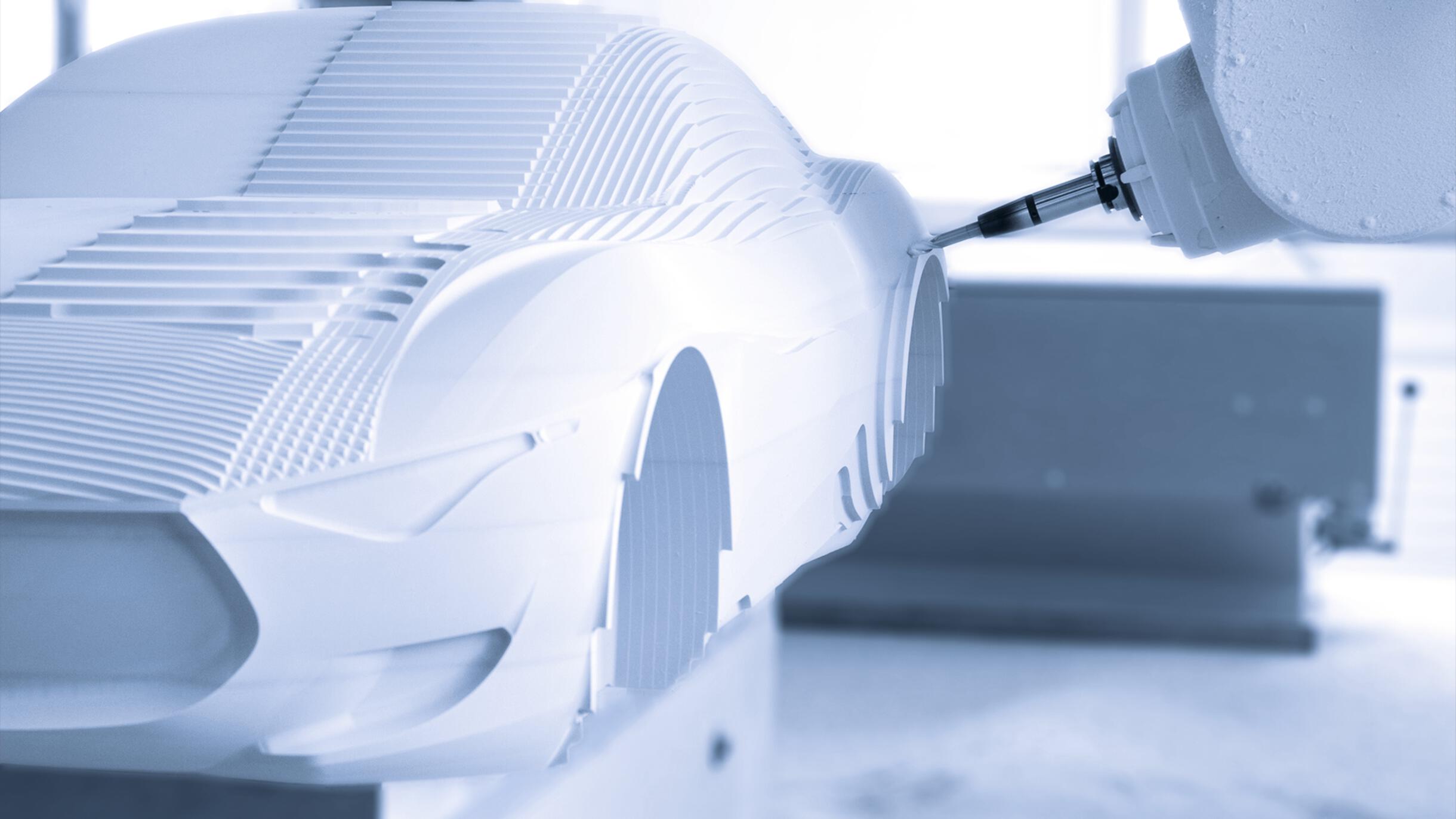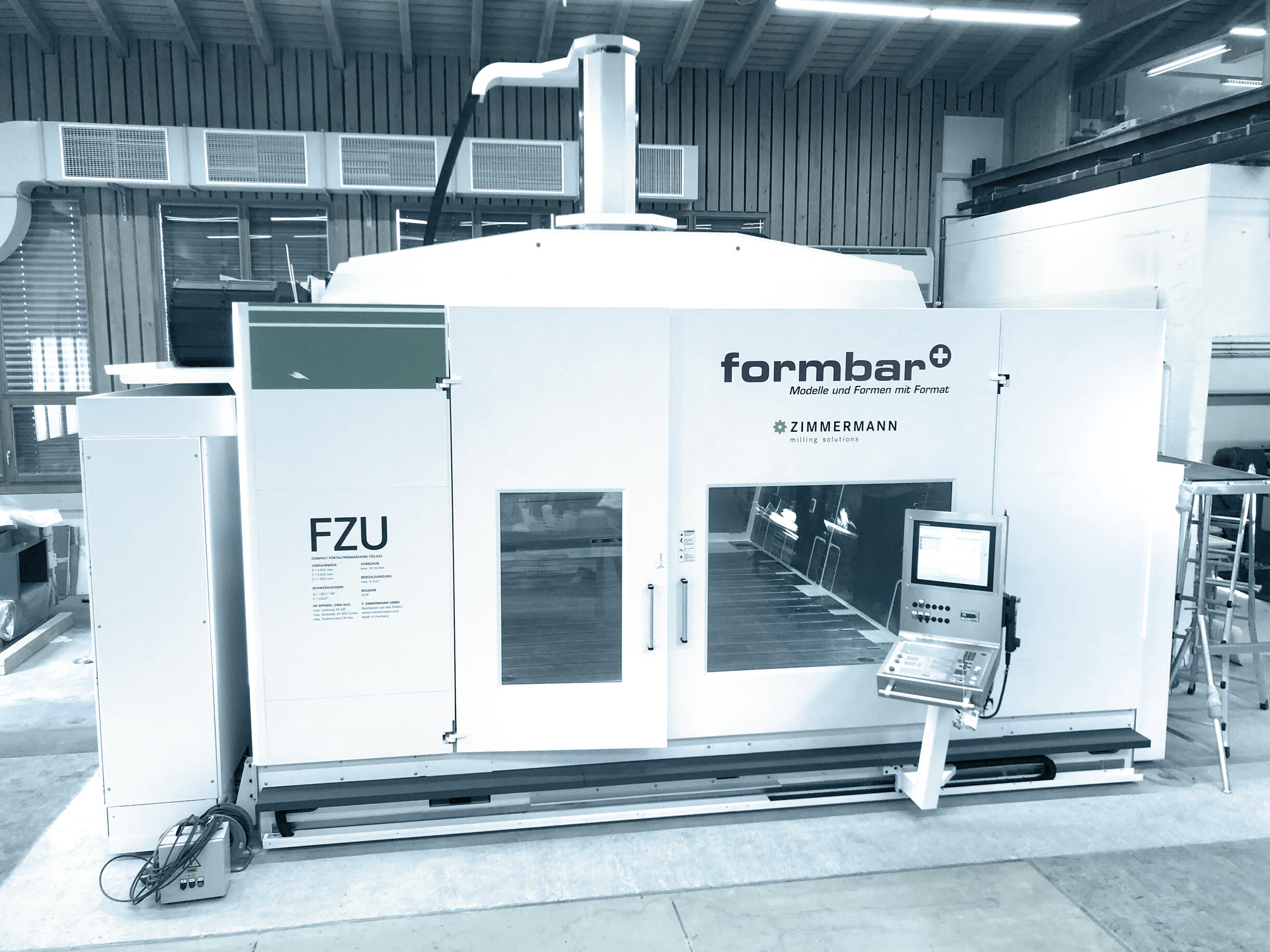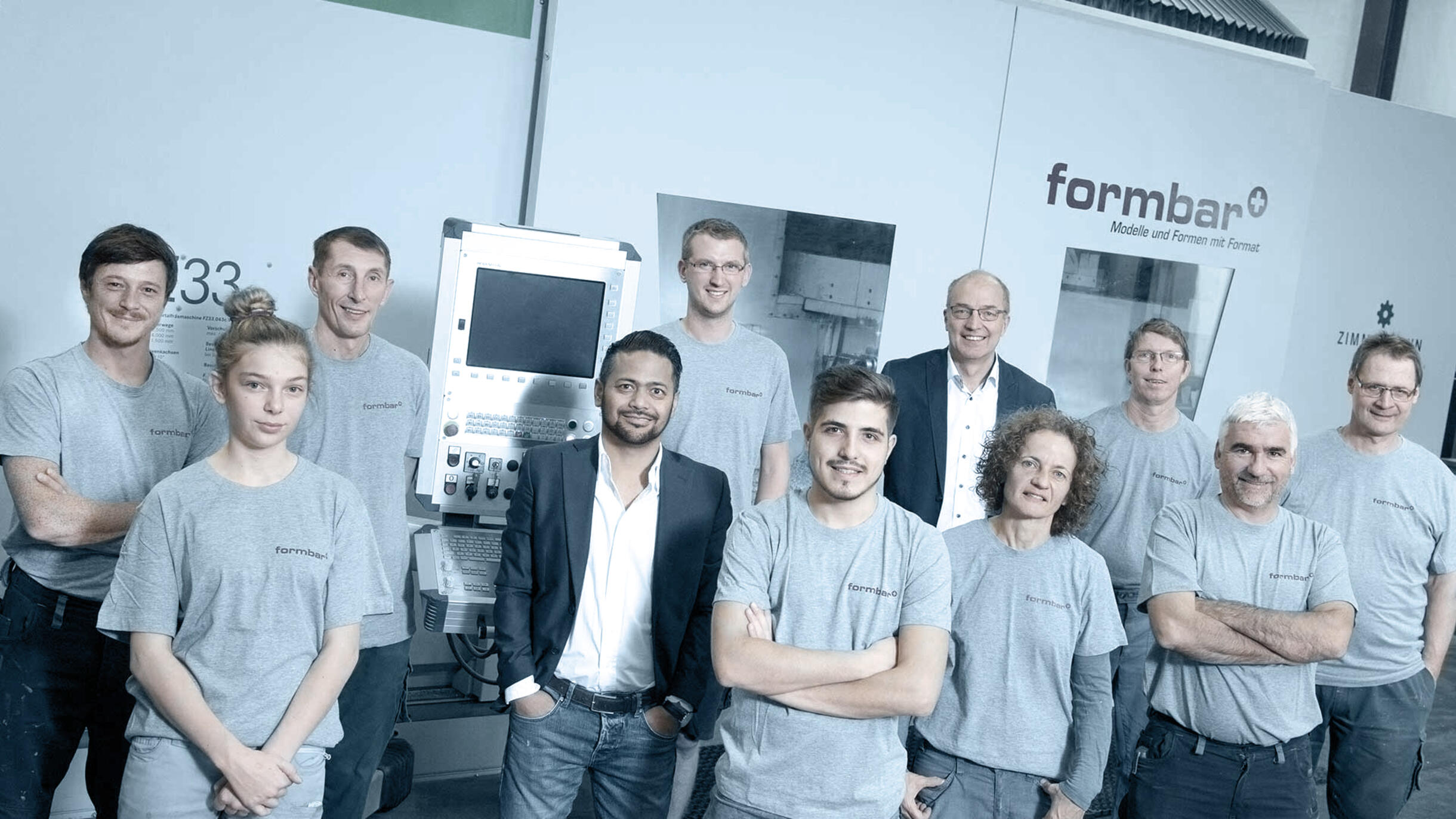-
Software
-
CAM software
- Tebis Automill
- CNC programming
- CNC automation
- CNC simulator
- Multiple setup
- Robotic machining
- CNC drilling
- Deep-hole drilling
- Combined turn-milling
- CNC turning
- Turn-milling
- 2.5D milling
- 3D milling
- 5-axis milling
- Slot milling
- Trimming
- HPC milling
- HFC milling
- Circle-segment cutters
- Sinker EDM
- Wire EDM
- 3D laser cutting
- Laser hardening
- Laser weld cladding
- CAD software
- CAQ software
- MES software
- Products
-
CAM software
- Services
- Consulting
- Sectors
- References
- Company
- News

-
 Home References
Home ReferencesA phoenix rises from the ashes
How Formbar AG got permanently out of the red and firmly established itself on the market with the support of Tebis Consulting.
Company
Formbar AG
Location
Kirchdorf, Switzerland
Focus
Casting models, components for the motor sports, aerospace and automotive industries.
Benefits:
- Enormous wealth of experience
- Powerful machinery
- NC automation
Published
2018

Interviewee: Kaspar Hürlimann, Managing director
One of our customers used Tebis and achieved faster and better results than with other software solutions that we were working with. When other customers and colleagues from the industry experienced the same results, we decided to test Tebis.
Kaspar Hürlimann, Managing director Formbar AG, Kirchdorf, SwitzerlandKaspar Hürlimann didn't have an easy start when he took over the management of Keller Modell- und Formenbau AG in 2012. At that time, his main customers outsourced everything to low-wage countries and his turnover plunged by 75%. "It was a very difficult time then, and many told me that I could not do it," recalls Hürlimann. But the trained model maker and mechanical engineer, with a master's degree in technical economics, rolled up his sleeves and turned the company around. He was supported by confident investors and by Tebis Consulting, the manufacturing-related consulting arm of CAD/CAM software provider Tebis. Working together, they got the company back on course for success.
Software and services from Tebis
The managing director came across Tebis somewhat by chance. Hürlimann explains: "One of our customers used Tebis and achieved faster and better results than with other software solutions that we were working with. When other customers and colleagues from the industry experienced the same results, we decided to test Tebis." And this was how the software found its way into the company's every-day tasks. Hürlimann also tapped into additional consulting on process optimization and management from Tebis Consulting.
This task was assigned to Markus Rausch, a consultant at Tebis Consulting and a trained industrial mechanic with a degree in mechanical engineering. He also had practical experience as a production manager and deputy managing director in a medium-size mold manufacturing company. He first analyzed all processes and procedures of the afflicted model and mold manufacturing company and spoke with employees in manufacturing and management. This was a completely new experience for Hürlimann. "It is truly interesting to have one’s own processes evaluated from outside. Of course, we wanted to be faster, better and bigger; the only question was how."
Analysis reveals potential
Rausch knows from experience that an impartial examination from outside often reveals opportunities that had not been considered as well as weaknesses. Initial results of the analysis and the benchmark yielded low machine utilization and spindle times, dissatisfied employees and a challenging market and price situation. "Despite all the difficulties, we saw a great deal of potential, highly trained employees and outstanding equipment. Returning the company to the profit zone was a major challenge, but we wanted to achieve this together," says Rausch.
Based on the extensive analysis data, he determined which process steps were creating value, which were necessary and which were superfluous. He also addressed uncomfortable truths: For example, the fact that evolved structures and established internal processes were too cumbersome and no longer up to date. "Initiating successful change here requires a great deal of persuasion and tact," explains the consultant. But he has just the right measures to address this in his bag of tricks.
To reposition the company on the market, Rausch and Hürlimann developed a concept that aligned with the company’s existing core competencies and introduced clear structures and automated processes. Tebis Consulting provided support and implementation of the new target market strategy.
 From left to right: Kaspar Hürlimann - managing director, Raoul Ganz - deputy managing director, Michael Hilpert - deputy head of production, Urs Friedrich - head of production
From left to right: Kaspar Hürlimann - managing director, Raoul Ganz - deputy managing director, Michael Hilpert - deputy head of production, Urs Friedrich - head of productionQuick success through management consulting
While major projects in foundry model making were originally the mainstay for the model and mold manufacturer, the product portfolio was expanded, including orders from areas like aerospace and motor sports. "Formbar thereby gradually evaded the ongoing price drop in foundry model making that resulted from the increasing outsourcing of production to Eastern Europe," explains Rausch. The company also received many orders from abroad – this was not a problem in itself. But the heavy currency fluctuations in the Euro compared with the Swiss Franc gave rise to additional worries. "We therefore wanted to establish a stronger presence for Formbar in the Swiss market," says Rausch.
A very important point for the consultant: Always including the employees in every analysis and implementation, answering their questions and discussing their concerns in order to ensure a successful change. Through coaching and training sessions, Rausch sensitized managers as well as managing directors to the changes and associated employee needs. Hürlimann recalls: "The meetings and training sessions really did improve acceptance, and our new bonus system provided additional motivation."

Tangible results in process consulting
Formbar also received support from Tebis implementation experts: They ensured that the company reaped the full benefits from individual configuration of the Tebis software and could implement greater automation in manufacturing. For example, Hürlimann invested in various interfaces. "This enabled the trouble-free import of files from other systems such as Catia or Siemens NX, including all the structures. This is a clear benefit for the large and complex parts that we manufacture with the highest precision and accuracy," he says. Simultaneously, the Tebis experts stored individual expert knowledge from the employees as well as all information on the tools and machine groups, cutting data and feed rates and for blanks and parts in virtual databases, the Tebis libraries. This enables every programmer to easily access this knowledge. Predefined programming templates and features make daily tasks much simpler. The reason: They optimize and standardize processes, thereby accelerating reliable NC programming. "Our NC programmers were very enthusiastic after a very short time," recalls the managing director. "Our customers are highly satisfied with the quality of our products and our on-time delivery. Tebis certainly played a major role in enabling us to work so efficiently today," says Hürlimann.
Investment increases flexibility
Formbar also invested in new machinery. The absolute highlight of the restructuring was the acquisition of the FZ 33 Compact 5-axis CNC gantry milling machine. This was the third in our bundle of CNC milling machines, which already included a Zimmermann FZ30 5-axis CNC gantry milling machine and a Quaser MV-304C 3-axis milling machine. "This machine perfectly complements our existing machinery. It has a traversing range of 4 x 2.5 x 1.5 meters, is extremely flexible and is more than twice as fast as our existing 5-axis gantry milling machine," says Kaspar Hürlimann enthusiastically. Its enormous performance spectrum enables the manufacturer of components for all types of industry.
The measures taken bore fruit: Within a year, Formbar had achieved a significant plus in efficiency and process reliability. Machine run times and sales have since doubled, with no change in the workforce. The increased flexibility resulted in many new customers: Formbar is now positioned for a viable future in the Swiss market. In addition to casting models, the company now also manufactures parts for the motor sports, aerospace and automotive industries. It benefits from the enormous wealth of experience of its employees and the flexibility of its machines.
From the beginning, Hürlimann absolutely wanted to rank among the best; now he has achieved this. "This shows that we selected the right consultant. Tebis Consulting has given us competent support, Hürlimann emphasizes. However, the managing director is not resting on his laurels and is further developing the company. An ATOS Compact Scan 12M optical measuring system from GOM has been in use since January 2019. Tebis was also included in this process and Hürlimann is continuing to plan the future with the CAD/CAM/MES provider. New this month, one of the fastest gantry milling machines, a 4 m x 3 m x 1.5 m Zimmermann FZU, is now available in the new air-conditioned production building. "I'm looking forward to it. The collaboration with Tebis is great. Motivated employees and ultra-modern infrastructure provide for both customer satisfaction and fun at work."
 Optimized machinery: The new 5-axis CNC gantry milling machine
Optimized machinery: The new 5-axis CNC gantry milling machineAbout Formbar AG
Formbar AG began as "Keller Modell- und Formenbau AG" and is located in Kirchdorf in the Swiss Canton of Aargau. It was founded in 1911 and has been operated as a family business for three generations. During this time, the company has developed from a manually intensive sawmill to a modern model and mold manufacturer, based entirely on computer-supported systems. In 2014 Keller Modell- und Formenbau AG rebranded itself, becoming the current Formbar AG.
Today, Formbar manufactures foundry models and parts for the motor sports, aerospace and automotive industries. Everything is done within the company – from preparation, to programming, assembly and production, to finishing. The 13 employees, including 2 apprentices, know exactly how to work with the various materials such as plastic, aluminum, wood or carbon.
 Back, left to right: Cyril Schmid - CAD/CAM, apprentice trainer Andreas Walter - CAD/CAM mold maker, Michael Hilpert - deputy head of production, Kaspar Hürlimann - managing director, Victor Angst - CAD/CAM mold maker, Beat Gnepf - AVOR model maker; front, left to right: Eliane Hehl - mold maker (3rd-year apprentice), Raoul Ganz - deputy managing director, Patrick Ronner - CAD/CAM mold maker, Adile Karatas - CAD/CAM mold maker, Urs Friedrich - head of production; not shown: Gregor Dannenberger - mold maker, Jann Meier - mold maker (1st-year apprentice)
Back, left to right: Cyril Schmid - CAD/CAM, apprentice trainer Andreas Walter - CAD/CAM mold maker, Michael Hilpert - deputy head of production, Kaspar Hürlimann - managing director, Victor Angst - CAD/CAM mold maker, Beat Gnepf - AVOR model maker; front, left to right: Eliane Hehl - mold maker (3rd-year apprentice), Raoul Ganz - deputy managing director, Patrick Ronner - CAD/CAM mold maker, Adile Karatas - CAD/CAM mold maker, Urs Friedrich - head of production; not shown: Gregor Dannenberger - mold maker, Jann Meier - mold maker (1st-year apprentice)

